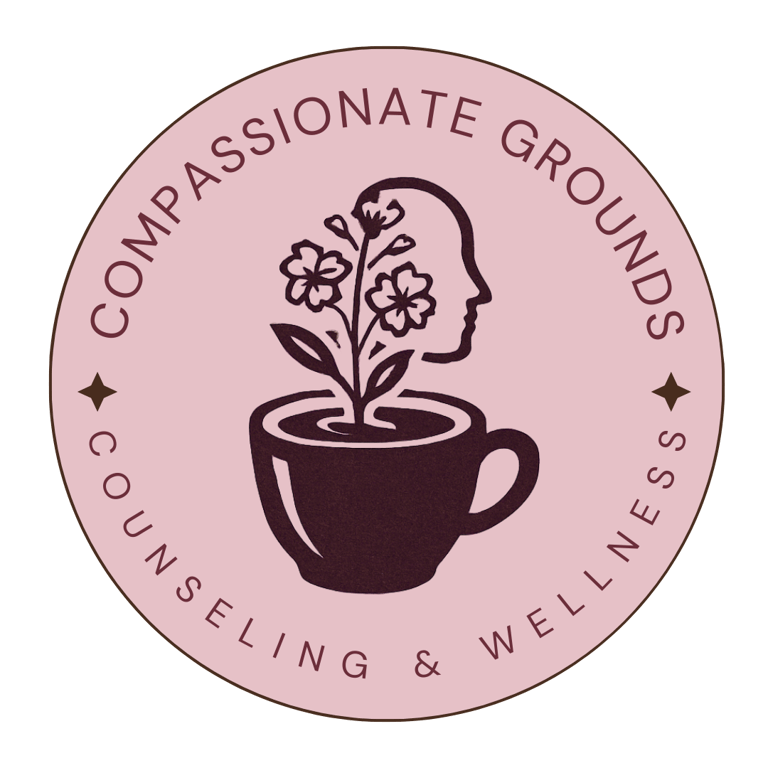The Power of Self Compassion: What it is and why you should care
SELF COMPASSION
Deanna S., LCSW
1/5/20255 min read


I can’t remember exactly when I first heard the term self compassion, but I can say that it’s only been the last few years or so that I’ve become more aware of it and actually become intentional about practicing it and teaching it to others.
I’ll start with a brief intro to the word compassion on its own — as I’m sure I will eventually write another more in in depth post on that. I often ask my clients to tell me what comes to mind when they hear the word compassion. People usually say things like “kindness,” “empathy,” “love,” and “care.” These associations are not wrong — in fact, all of these words are associated with compassion but they are not the entire picture. So let’s paint that picture…
A well rounded view of compassion
Compassion comes from the Latin root compati, which means "to suffer with" — or, in other words, to suffer together. Not exactly a pleasant thought, right? But when you truly understand what compassion is, it starts to make sense. As a therapist, I often work within the framework of Compassion Focused Therapy, which defines compassion as a sensitivity to suffering in self and others, coupled with a commitment to alleviate and prevent it. So, compassion isn’t just about feeling for someone—it’s about noticing when they’re struggling, having the courage to sit with their suffering, and having the wisdom to take action, whatever that action may be. Now, if the word suffering sounds a bit too heavy, it doesn’t have to be. You could replace it with terms like “struggling,” “having a difficult time,” or “navigating challenges.” The point is, compassion requires awareness—the ability to recognize when someone, including yourself, might need support. And yes, you deserve that same care and understanding. That’s where self-compassion comes in.
What is self compassion?
Self compassion is the practice of being kind and understanding towards oneself, especially when faced with difficulties or challenges. So it’s the opposite of criticizing yourself when you make mistakes, judging yourself for your actions, getting angry with yourself for having emotions, etc.
Kristen Neff, who is essentially the queen of self compassion research, defines self compassion as having three elements:
Self-Kindness
Instead of harsh self-criticism or judgment, self-kindness is about being gentle with yourself when things don’t go as planned. It’s about embracing yourself in moments of failure or difficulty, recognizing that you're human and deserve understanding.Common Humanity
This aspect of self-compassion is recognizing that suffering and imperfection are part of the shared human experience. When we feel isolated in our struggles, it can deepen feelings of loneliness and inadequacy. Common humanity helps remind us that we are not alone in our challenges, and that everyone faces struggles. Yes everyone’s struggles look different — but suffering is not unique to you. Suffering does not mean that anything is inherently wrong with you. You are human.Mindfulness
Mindfulness is the ability to stay present and aware of your feelings without judgment. In self compassion, mindfulness allows you to acknowledge your pain without exaggerating or suppressing it. It’s about holding space for your emotions without being overwhelmed by them.
So why should you care?
Neff’s research (and I’m sure that of others) shows us that self compassionate people are more likely to feel happy, optimistic and satisfied with their lives, have a stable and unconditional sense of self-worth, be appreciative of and satisfied with their bodies, have higher levels of emotional intelligence, be forgiving and compassionate toward others, be strong and resilient when faced with hardship, focus on learning and personal growth, cope with work challenges and feel more competent and effective at their jobs — among many other things. If you’re into reading the research for yourself you can find it here. The point is there are a lot of reasons to care. The research also tells me that self compassion is the antidote to shame — and shame is an emotion that stems from believing there is something wrong with you, that you are inherently bad. Shame is an incredibly powerful emotion, and if self compassion can combat shame I think that speaks volumes.
I personally have found self compassion to be helpful — much more so than self criticism. I think that self criticism tricks us into believing that it’s helpful, that it motivates us, that it protects us. To be honest, it can do those things in a way, but it often comes with consequences as well. For me, motherhood is an experience in which I have found self compassion to be very beneficial. It was very easy to judge myself or compare myself to others — especially in those early stages of being awake breastfeeding a newborn at 3am and scrolling social media usually to find other moms who appeared to have it all together while I was a wreck. I’m not saying I never fall into self criticism anymore — however, I can much more easily notice that and make the choice to switch to a compassionate way of responding to myself. Perfection is not the goal.
How to practice self compassion
So I’ve done a lot of talking (writing?) — time to get to the action. Let’s talk about a few simple practices you can easily integrate into your daily life.
Recognize Self-Criticism and Replace It with Kindness: The first step in practicing self-compassion is awareness. Start by noticing when you're being hard on yourself. When you notice yourself criticizing or judging, try pausing and asking, “Would I say this to a friend?” If not, replace the negative self-talk with something kinder: “It’s okay, everyone makes mistakes,” or “I’m doing the best I can,” or “it makes sense that I feel (blank) because (blank).”
Give yourself a hug: Yes, it’s true. A hug (or any kind of gentle touch) releases oxytocin — the “love hormone.” On the other hand, self criticism activates the amygdala which was designed detecting physical threats, but reacts in the same way to emotional threats (emotional threats in this case being self criticism)
A mindful check in: take a moment each day — or multiple times a day — to ask yourself the following questions
What am I observing?
What am I feeling?
What do I need right now?
Do I have a request of myself or someone else?
Self compassion journal: in the evenings write down anything you felt bad about, judged yourself for, or any difficult experiences that caused you pain during the day. Process and respond in a self compassionate way using mindfulness, common humanity, and self kindness
Write down how you felt (mindfulness)
The ways in which your experience is connected to the human experience (common humanity)
Some kind comforting words (self kindness)
If you enjoy journaling and would benefit from more guided journal prompts on self compassion take a look at my digital self compassion journal, From the Ground Up!
Engage in Self-Soothing Activities: whether it's a warm bath, journaling, taking a walk, stretching, or deep breathing, self-soothing activities can help you relax and reconnect with yourself. Make time for these practices regularly, especially when you’re feeling overwhelmed or stressed.
Let’s tie it all together in a bow
Alright, so we’ve covered what self-compassion is, why it matters, and some actionable tips to start bringing it into your life today. Remember, it might feel a little uncomfortable or even strange at first—and that’s okay. It’s completely normal. Just like any new skill, it takes time and practice to make it feel more natural. So, keep at it. And here’s the thing: it won’t be perfect. You won’t be perfect—and that’s not the goal. The goal is progress, not perfection. You’re a human being, navigating life the best you can. So, give yourself compassion along the way <3
Take care,
Deanna
